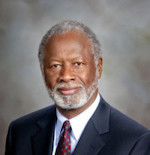The Plain Dealer’s editorial indictment of Congresswoman Shontel Brown’s stewardship of the county Democratic Party was unfair and uninformed and you don’t have to be a fan of hers to see that. It almost seemed as if the paper is resolved to condemn her in perpetuity for her unwise decision not to step aside from the chair when she decided to run for Congress.
It’s true that the party is in a deplorable condition: Ill-funded, dysfunctional, hamstrung by antiquated procedures, understaffed, absent a vision, fractured by ethnic tensions, and organized around no coherent principles.
In short, these are chronic ailments the party has suffered from for at least the last 30 years.
The root causes of this diagnosis we’ll leave to another day. Suffice to say here that while Shontel Brown didn’t fix any of these problems, she didn’t cause them either.
In fact, it could be argued that her very election as chair in 2017 was a lagging indicator of the dysfunction. She could never have been elected chair of a large, healthy, effective party organization.
Brown ‘s predecessor, Stuart Garson, was pushed into the job by then-Congresswoman Marcia Fudge and Senator Sherrod Brown. Garson, while a highly successful worker’s comp lawyer, was equipped neither by experience or temperament to rebuild the party after the disastrous reign of Jimmy Dimora, a lazy, dishonest party boss of limited intellectual horizons.
Garson was a shortsighted hire, picked for his dependability and his prowess as a fundraiser for candidates. He had scant interest in party reform, and zero zeal for engaging in precinct politics. His best act as chairman may have been his exit, when he warned against the forces that were pushing a wide-eyed but unfocused Brown to the front. Of course he had no constituency and his words went unheeded.
Brown’s best move as chair was to hire an untested Ryan Puente as executive director. He was more than capable to cure the disorganization, bring order to party process, and restore campaign efficiency, but not by himself. Like Garson, Brown had no appetite for the work; she preferred to preen as the first black and the first woman.
Eventually the overworked, underpaid and under-appreciated Puente resigned. He went to work for a skinny unknown eastside kid who had never run for office. A year later that kid — Justin Bibb — was elected mayor of Cleveland.
Then — shall wonders never cease — the heavens parted, Fudge was elevated to President Biden’s cabinet, creating an open Congressional seat into which Brown was uniquely positioned to slide.
The problems of the Cuyahoga County Democratic Party will not be cured by the election of Brown’s successor. Our sources tell us that a Euclid state rep. Kent Smith is the odds- on favorite. His recruitment of Richmond Hts. mayor Kim Thomas, a Fudge ally, signals his support from an important party wing.
Smith has been an effective if somewhat autocratic city party leader in Euclid. He knows how to run a party organization. It remains to be seen if can raise funds effectively for the party. His status as an elected public official will not seriously hinder his candidacy.
Rob Zimmerman of Shaker Heights is Smith’s principal challenger. Zimmerman, a former city councilman and a fulltime lawyer, is likely the best fundraiser among those seeking the party chairmanship. He would not be encumbered by elective office.
But Shaker Heights epitomizes the party’s genteel wing and it’s unclear that Zimmerman is equipped for bare-knuckled conflict resolution, which in the Democratic Party is not quite the oxymoron one might like it to be.
We are intrigued by the candidacy of westsider David Brock, who brings an understanding of modern campaign tactics that is considerably more advanced than either of his principal rivals.
The best outcome for the Party might be to reach back to a remedy from the 1970s: a tripartite chairmanship. Brock, Smith and Zimmerman each have strengths to bring to the table. Together they might begin to form a long-range strategy to reform and revitalize a party that has lost its way.
County Democrats are badly in need of a new vision and a new organization. The old formula that helped salve a crucial racial divide in the 1970s could prove useful almost fifty years later.
The Party's central committee will meet June 18 to decide its new leadership.
• • •• • •











